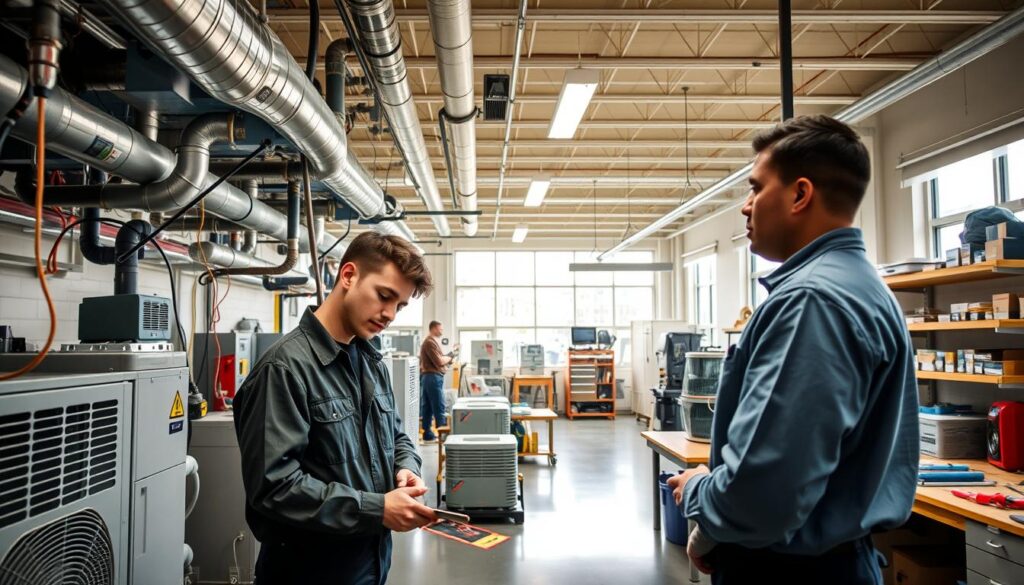Affiliate Disclosure
HVAC Guide Guys is a participant in the Amazon Services LLC Associates Program, an affiliate advertising program designed to provide a means for sites to earn advertising fees by advertising and linking to Amazon.
How Easy Is It to Learn HVAC? Are you ready to dive into a career that keeps America comfortable? Learning HVAC might be easier than you think. With the demand for HVAC technicians expected to surge by 9 percent between 2023 and 2033, this field offers exciting opportunities for those willing to invest in their skills.

How easy is it to learn HVAC? The answer depends on your dedication and aptitude for technical training. The HVAC training requirements are straightforward but demand commitment. Currently, 397,450 HVAC mechanics and installers work across the United States, proving that this career path is accessible to motivated individuals.
The best part? You don’t need a four-year degree to get started. HVAC training programs can range from six months to two years, providing a relatively quick entry into a stable and growing profession. With an average annual salary of $59,620, learning HVAC can be a smart career move for those interested in hands-on technical work.
Key Takeaways
- HVAC job market grows faster than average national employment rates
- Training programs can be completed in 6-24 months
- No four-year degree required to enter the field
- Potential for competitive salary and job stability
- Opportunities exist across various work environments
Table of Contents
Understanding the HVAC Industry Landscape
The HVAC industry is a vibrant and promising field for those looking to start a career. It’s valued at nearly USD 159 billion in 2022 and is expected to hit $227 billion by 2028. This growth offers a lot of opportunities for advancement.
Job Market Growth and Opportunities
The HVAC industry is growing fast, with jobs expected to rise by 5% from 2021 to 2031. This means there are many paths to follow in this field. Here are some key points:
- Over 145,142 HVAC companies operate in the United States.
- About 659,906 HVAC professionals are currently working.
- The industry’s annual revenue is $150 billion.
Types of HVAC Work Environments
HVAC technicians work in many different places. Your skills will decide where you can shine:
- Residential installations
- Commercial building maintenance
- Industrial system management
- Specialized technical services
Industry Demand and Salary
The HVAC industry offers good pay. HVAC technicians earn an average of $49,500. As you gain more skills, your salary can grow even more.
| Region | HVAC Jobs | Average Salary |
|---|---|---|
| California | 69,400 | $52,000 |
| New York | 68,100 | $51,500 |
| Texas | 67,300 | $50,000 |
“The HVAC industry offers not just a job, but a dynamic career with continuous learning and growth opportunities.” – Industry Expert
New technologies like smart HVAC systems and sustainable designs are opening up new career paths. These changes make the field exciting for those who are ready to learn and adapt.
Explore Our HVAC Shop
Looking for top-rated HVAC tools, parts, and accessories? Visit our shop and find the perfect solution for your needs.
Visit the ShopEssential Skills and Requirements for HVAC Training
Starting a career in HVAC needs a mix of technical skills and practical abilities. First, you must understand the basic training needed for success in this field.
To do well in HVAC, you must have a wide range of skills. Employers look for both academic knowledge and hands-on skills.
- Educational Foundation
- High school diploma or GED
- Strong background in mathematics and physics
- Computer science and shop classes
- Technical Skills
- Electrical system understanding
- Mechanical repair abilities
- Refrigeration principles
- Troubleshooting expertise
“Success in HVAC is about combining technical knowledge with practical problem-solving skills.” – HVAC Industry Expert
Being physically fit is key in HVAC careers. You’ll need to lift heavy equipment, work in tight spaces, and handle tough environments. The job requires both sharp thinking and physical strength.
| Skill Category | Key Requirements |
|---|---|
| Technical Knowledge | Thermodynamics, electrical systems, mechanical principles |
| Soft Skills | Communication, time management, customer service |
| Physical Abilities | Strength, flexibility, comfort in various work environments |
Keeping up with new technology is essential in HVAC. The field changes fast, so you must keep learning. Employers like people who are eager to learn and keep up with new tech.
How Easy Is It to Learn HVAC?
Exploring HVAC training might seem daunting, but knowing the learning curve helps. It shows how to get ready for success. To learn HVAC, you need to be dedicated, have technical skills, and be ready for both theory and practice.
Learning Curve and Time Investment
Starting as an HVAC pro takes a structured path. HVAC certificate programs usually last about 9 months. This gives you a strong start in your career. Apprenticeships, lasting 3 to 5 years, offer more hands-on training.
Physical and Technical Demands
HVAC requires both mental and physical readiness. You need to be okay with:
- Complex electrical systems
- Mechanical components
- Problem-solving techniques
- Physical labor in various environments
Common Challenges for Beginners
Beginners face specific hurdles when learning HVAC:
- Understanding refrigerant certification classifications
- Mastering complex technical skills
- Adapting to physical work requirements
- Continuous learning and technology updates
| Certification Type | Focus Area |
|---|---|
| Type I | Small appliance servicing |
| Type II | High-pressure systems |
| Type III | Low-pressure systems |
“Success in HVAC requires passion, persistence, and a commitment to continuous learning.” – HVAC Industry Professional
The journey is tough, but the rewards are great. With a 15% job growth rate by 2026, HVAC is a promising career for those who are eager to learn.
Educational Pathways in HVAC
Starting your HVAC career is exciting. You first need to pick the right hvac trade school or training program. This choice should fit your career goals and how you learn best.
There are several ways to become an HVAC technician:
- Certificate Programs (6-12 months)
- Associate Degree Programs (2 years)
- Apprenticeship Programs (3-5 years)
- Vocational Training Courses
When looking at hvac education, consider a few important things:
- Program Duration: Most certificate programs last about 9 months
- Curriculum Depth: Look for programs that cover diagnostic training, tool usage, and technical principles
- Hands-On Experience: Practical training is key for skill building
“The right HVAC education can transform your career trajectory” – Industry Expert
Your hvac trade school should offer in-depth training. This includes refrigeration systems, electrical principles, and safety protocols. The U.S. Bureau of Labor Statistics says formal training boosts your job chances in this field.
Getting certified can also make you stand out. Options like EPA 608 Certification and OSHA safety credentials can open more doors for you.
HVAC Certification and Licensing Requirements
Understanding HVAC certification can be tricky, but knowing the basics is key to a successful career. To become a professional HVAC technician, you must complete several important steps. These include certifications and licenses.
EPA 608 Certification Process
The EPA 608 Certification is a big step in HVAC training. It lets you work with refrigerants safely and legally. There are four types of certifications:
- Type I: Small appliances
- Type II: High-pressure appliances
- Type III: Low-pressure appliances
- Universal: All equipment types
State-Specific Licensing Guidelines
Each state has its own rules for HVAC training and licenses. In Ohio, for instance, you must meet certain requirements:
| Requirement | Details |
|---|---|
| Experience | Minimum 5 years commercial HVAC experience |
| Exam Costs | $138 total ($69 for business/law, $69 for trade exam) |
| License Application | $25 fee |
| Insurance | Minimum $500,000 liability coverage |
Additional Professional Certifications
Getting specialized certifications can boost your career. Look for them from trusted organizations:
- NATE (North American Technical Excellence) – Offers advanced technical certifications
- HVAC Excellence – Provides professional credentials
“Continuous learning and certification are the keys to success in the HVAC industry.” – HVAC Industry Expert
By getting these certifications, you show your skills. This makes you more attractive to employers. It also opens up more career paths in HVAC.
Explore Our HVAC Shop
Looking for top-rated HVAC tools, parts, and accessories? Visit our shop and find the perfect solution for your needs.
Visit the ShopHands-On Training and Apprenticeship Programs

Starting your HVAC career needs more than just books. HVAC apprenticeships mix classroom learning with real-world practice. These programs last from 6 months to 2 years, giving you deep vocational training.
Your HVAC training includes several important parts:
- Structured classroom instruction
- Hands-on equipment training
- Real-world job site experience
- Mentorship from industry professionals
These programs are very effective. About 80% of HVAC training programs include hands-on experience. This helps you learn the skills you need to succeed. Around 70% of HVAC technicians say hands-on training was key to their growth.
“Practical experience transforms theoretical knowledge into professional expertise.” – HVAC Industry Expert
Most HVAC apprenticeships offer big benefits. You can expect:
- Potential earnings while learning
- Direct exposure to professional work environments
- Networking opportunities with industry professionals
- Potential job placement support
The HVAC industry is growing fast, with a 5% increase from 2021 to 2031. It’s creating about 38,000 new jobs each year. Companies want candidates with structured training and a strong learning mindset.
Pro tip: Early spring (February to April) is the best time to look for jobs. Companies start hiring more for the busy summer season then.
Career Advancement Opportunities in HVAC
Your HVAC career path is full of exciting opportunities for growth and specialization. As you improve your hvac skills, many professional paths open up. This lets you turn your initial training into a fulfilling long-term career.
Specialization Options
HVAC professionals can explore various specialization tracks. These match their interests and strengths. Key areas include:
- Commercial Refrigeration Systems
- Green Energy Infrastructure
- Industrial Process Cooling
- Building Automation Systems
- Energy Efficiency Consulting
Career Path Progression
Your career journey has a clear path:
- Entry-Level Technician
- Certified HVAC Specialist
- Senior Service Technician
- Project Manager
- Operations Manager
- Business Owner
Advanced Certification Benefits
Getting advanced certifications can greatly improve your career. Specialized credentials show your expertise and can lead to higher pay.
“Continuous learning is the key to success in the HVAC industry.” – HVAC Industry Expert
Advanced certifications can increase your salary by up to 20%. They also open the door to management and specialized technical roles. Think about getting EPA 608 Universal Certification, NATE certifications, and training from manufacturers.
Explore Our HVAC Shop
Looking for top-rated HVAC tools, parts, and accessories? Visit our shop and find the perfect solution for your needs.
Visit the ShopSelf-Study and Online Learning Resources
Today, finding hvac learning resources is easier than ever. You can now learn from home, making training flexible and easy to access.

Many online platforms offer great HVAC training programs. These can help start your career. Here are some top resources:
- HVAC Talk Forum (150,000+ professionals)
- Danfoss Learning Site (376+ cooling lessons)
- iKnow Learning Portal (15,000 industry members)
- U.S. Career Institute Online Program
Online learning has big benefits for those wanting to be HVAC technicians:
- Flexible scheduling
- Self-paced learning
- Cost-effective training
- Access to expert content
“Digital learning platforms are changing how HVAC professionals learn.” – HVAC Industry Expert
| Platform | Key Features | Cost |
|---|---|---|
| U.S. Career Institute | EPA 608 Exam Preparation | $1,239 Total Tuition |
| Zoom Study Groups | Free Group Sessions | 40-minute Free Sessions |
| Danfoss Learning | Industry-Specific Lessons | Free/Subscription Options |
Remember, while online resources are valuable, practical hands-on experience is key in HVAC training. Mix digital learning with apprenticeships for the best career growth.
Conclusion
Learning about HVAC shows it’s a dynamic and rewarding career. It needs dedication, technical skills, and a willingness to keep learning. Success depends on knowing the industry well and getting thorough training.
The HVAC career path has many ways to start. You can choose from 6-month certificate programs to 3-5 year apprenticeships. Each path has its benefits, with hands-on training leading to more jobs. You can learn online or in person, depending on what works best for you.
Being good at technical skills is key in HVAC. You’ll learn about complex systems, improve your problem-solving, and keep up with new tech. It’s hard, but the pay is good, jobs are stable, and you can specialize in different areas.
Your success in HVAC depends on always learning, staying fit, and being proactive. By keeping up with education and staying positive, you can turn challenges into chances for a rewarding career.
FAQ
How difficult is it to learn HVAC?
What educational background do I need to start HVAC training?
How long does it take to become a certified HVAC technician?
What are the primary challenges in learning HVAC?
Are online HVAC training programs effective?
What is the typical cost of HVAC training?
How difficult is it to learn HVAC?
What educational background do I need to start HVAC training?
How long does it take to become a certified HVAC technician?
What are the primary challenges in learning HVAC?
Are online HVAC training programs effective?
What is the typical cost of HVAC training?
FAQ
How difficult is it to learn HVAC?
Learning HVAC takes some effort and dedication. It’s not too hard if you’re good at solving problems and have mechanical skills. You’ll learn both theory and practical skills, which can take 6-24 months.
What educational background do I need to start HVAC training?
You need a high school diploma or equivalent to start. Courses like math, physics, computer tech, and shop classes are helpful. They give you a good base for HVAC training.
How long does it take to become a certified HVAC technician?
The time it takes varies. Vocational programs last 6-12 months, associate degrees about 2 years, and apprenticeships 3-5 years. After training, you’ll need certifications like the EPA 608 to work.
What are the primary challenges in learning HVAC?
Main challenges include understanding complex systems and developing stamina. You’ll also learn many skills and keep up with new technology. Problem-solving, attention to detail, and comfort in different environments are key.
Are online HVAC training programs effective?
Online training is helpful but can’t replace hands-on learning. The best approach is a mix of online learning and practical experience. Look for programs that offer both.
What is the typical cost of HVAC training?
Costs vary. Vocational programs cost
FAQ
How difficult is it to learn HVAC?
Learning HVAC takes some effort and dedication. It’s not too hard if you’re good at solving problems and have mechanical skills. You’ll learn both theory and practical skills, which can take 6-24 months.
What educational background do I need to start HVAC training?
You need a high school diploma or equivalent to start. Courses like math, physics, computer tech, and shop classes are helpful. They give you a good base for HVAC training.
How long does it take to become a certified HVAC technician?
The time it takes varies. Vocational programs last 6-12 months, associate degrees about 2 years, and apprenticeships 3-5 years. After training, you’ll need certifications like the EPA 608 to work.
What are the primary challenges in learning HVAC?
Main challenges include understanding complex systems and developing stamina. You’ll also learn many skills and keep up with new technology. Problem-solving, attention to detail, and comfort in different environments are key.
Are online HVAC training programs effective?
Online training is helpful but can’t replace hands-on learning. The best approach is a mix of online learning and practical experience. Look for programs that offer both.
What is the typical cost of HVAC training?
Costs vary. Vocational programs cost $1,200 to $15,000, associate degrees $10,000 to $30,000, and apprenticeships are often cheaper. Financial aid and scholarships can help pay for it.
What certifications do I need to work as an HVAC technician?
You need the EPA 608 Certification for refrigerants. NATE certifications, state licenses, and specialized certifications are also recommended.
What physical skills are important in HVAC?
You need strength, flexibility, and stamina for HVAC work. You’ll lift heavy, climb, and work in tight spaces. Good hand-eye coordination and dexterity are also important.
How can I gain practical experience in HVAC?
Get experience through apprenticeships, internships, and entry-level jobs. Many programs include hands-on work. Volunteering or getting advice from pros can also help.
What is the job outlook for HVAC technicians?
The job market is good, with 5% growth expected from 2021 to 2031. Demand for energy-efficient systems and tech advancements are driving this growth.
,200 to ,000, associate degrees ,000 to ,000, and apprenticeships are often cheaper. Financial aid and scholarships can help pay for it.
What certifications do I need to work as an HVAC technician?
You need the EPA 608 Certification for refrigerants. NATE certifications, state licenses, and specialized certifications are also recommended.
What physical skills are important in HVAC?
You need strength, flexibility, and stamina for HVAC work. You’ll lift heavy, climb, and work in tight spaces. Good hand-eye coordination and dexterity are also important.
How can I gain practical experience in HVAC?
Get experience through apprenticeships, internships, and entry-level jobs. Many programs include hands-on work. Volunteering or getting advice from pros can also help.
What is the job outlook for HVAC technicians?
The job market is good, with 5% growth expected from 2021 to 2031. Demand for energy-efficient systems and tech advancements are driving this growth.

